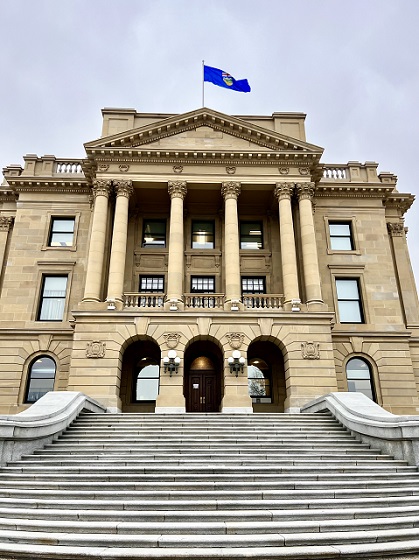Alberta
Alberta taking back control of federal agreements

Alberta has introduced legislation requiring provincial entities to obtain approval before entering, amending, extending or renewing agreements with the federal government.
The introduction of the Provincial Priorities Act, 2024 will support Alberta’s government in pushing back against the federal government’s ongoing overreach into areas of provincial jurisdiction. Alberta’s government will ensure federal funding is aligned with provincial priorities, rather than with priorities contrary to the province’s interests. Under the legislation, agreements between the federal government and provincial entities, including municipalities, that have not received provincial approval would be invalid.
As an example, the federal government’s unrelenting and ideological push toward electric buses in Canadian cities including Calgary does not acknowledge mounting evidence of significant problems with their effectiveness during harsh Alberta winters. Alberta’s government believes the funds that Ottawa allocated for unreliable and impractical electric buses would have been better spent on Alberta priorities including strengthening the province’s economic corridors with improved roads and commuter rail, or advancing the province’s hydrogen strategy as an alternate clean-energy source for transportation.
If passed, the legislation would also support Alberta’s government in getting its fair share of funding when it comes to roads, infrastructure, housing and other priorities. Nowhere is this more apparent than in housing. In summer 2023, Alberta received only 2.5 per cent of the total $1.5 billion in federal housing funds, despite having 12 per cent of the country’s population and, by far, the fastest population growth.
The legislation would also work to prevent taxpayer dollars being wasted on duplicative programs like pharmacare and dental care when what the province really needs is envelope funding to expand existing provincial programs in these areas.
“It is not unreasonable for Alberta to demand fairness from Ottawa. They have shown time and again that they will put ideology before practicality, which hurts Alberta families and our economy. We are not going to apologize for continuing to stand up for Albertans so we get the best deal possible. Since Ottawa refuses to acknowledge the negative impacts of its overreach, even after losing battles at the Federal and Supreme Courts, we are putting in additional measures to protect our provincial jurisdiction to ensure our province receives our fair share of federal tax dollars and that those dollars are spent on the priorities of Albertans.”
Currently, the Government Organization Act requires intergovernmental agreements to be approved by the Minister of Intergovernmental Relations for Alberta government departments and some public agencies, such as Alberta Gaming, Liquor and Cannabis; Alberta Securities Commission; and Travel Alberta.
However, this requirement does not extend to all Alberta public agencies or broader public sector organizations including municipalities, public post-secondary institutions, school boards and health entities, which has created gaps that could result in federal agreements contradicting provincial priorities and investments. By introducing the Provincial Priorities Act, Alberta’s government is working to close those gaps.
Under the proposed legislation, provincial entities include Alberta public agencies and Crown-controlled organizations, as well as public post-secondary institutions, school boards, regional health authorities, Covenant Health, municipal authorities and housing management bodies.
“For years, the federal government has been imposing its agenda on Alberta taxpayers through direct funding agreements with cities and other provincial organizations. Not only does Alberta not receive its per capita share of federal taxpayer dollars, the money we do receive is often directed towards initiatives that don’t align with Albertan’s priorities. Albertans from all corners of the province expect our federal share of taxes for roads, infrastructure, housing and other priorities – not federal government political pet projects and programs in select communities.”
Currently, Quebec is the only other province or territory with similar legislation that requires provincial approval of intergovernmental agreements between a broad scope of public sector organizations and the federal government. During a federal-provincial-territorial meeting in November 2023, Premiers from across the country demanded that the federal government work with them, not around them when it came to agreements with municipalities. Additionally, the Premiers committed to exploring the need for provincial authorization on federal agreements.
Related information
Alberta
Alberta government should eliminate corporate welfare to generate benefits for Albertans

From the Fraser Institute
By Spencer Gudewill and Tegan Hill
Last November, Premier Danielle Smith announced that her government will give up to $1.8 billion in subsidies to Dow Chemicals, which plans to expand a petrochemical project northeast of Edmonton. In other words, $1.8 billion in corporate welfare.
And this is just one example of corporate welfare paid for by Albertans.
According to a recent study published by the Fraser Institute, from 2007 to 2021, the latest year of available data, the Alberta government spent $31.0 billion (inflation-adjusted) on subsidies (a.k.a. corporate welfare) to select firms and businesses, purportedly to help Albertans. And this number excludes other forms of government handouts such as loan guarantees, direct investment and regulatory or tax privileges for particular firms and industries. So the total cost of corporate welfare in Alberta is likely much higher.
Why should Albertans care?
First off, there’s little evidence that corporate welfare generates widespread economic growth or jobs. In fact, evidence suggests the contrary—that subsidies result in a net loss to the economy by shifting resources to less productive sectors or locations (what economists call the “substitution effect”) and/or by keeping businesses alive that are otherwise economically unviable (i.e. “zombie companies”). This misallocation of resources leads to a less efficient, less productive and less prosperous Alberta.
And there are other costs to corporate welfare.
For example, between 2007 and 2019 (the latest year of pre-COVID data), every year on average the Alberta government spent 35 cents (out of every dollar of business income tax revenue it collected) on corporate welfare. Given that workers bear the burden of more than half of any business income tax indirectly through lower wages, if the government reduced business income taxes rather than spend money on corporate welfare, workers could benefit.
Moreover, Premier Smith failed in last month’s provincial budget to provide promised personal income tax relief and create a lower tax bracket for incomes below $60,000 to provide $760 in annual savings for Albertans (on average). But in 2019, after adjusting for inflation, the Alberta government spent $2.4 billion on corporate welfare—equivalent to $1,034 per tax filer. Clearly, instead of subsidizing select businesses, the Smith government could have kept its promise to lower personal income taxes.
Finally, there’s the Heritage Fund, which the Alberta government created almost 50 years ago to save a share of the province’s resource wealth for the future.
In her 2024 budget, Premier Smith earmarked $2.0 billion for the Heritage Fund this fiscal year—almost the exact amount spent on corporate welfare each year (on average) between 2007 and 2019. Put another way, the Alberta government could save twice as much in the Heritage Fund in 2024/25 if it ended corporate welfare, which would help Premier Smith keep her promise to build up the Heritage Fund to between $250 billion and $400 billion by 2050.
By eliminating corporate welfare, the Smith government can create fiscal room to reduce personal and business income taxes, or save more in the Heritage Fund. Any of these options will benefit Albertans far more than wasteful billion-dollar subsidies to favoured firms.
Authors:
Alberta
Official statement from Premier Danielle Smith and Energy Minister Brian Jean on the start-up of the Trans Mountain Pipeline

-

 Business2 days ago
Business2 days agoWEF panelist suggests COVID response accustomed people to the idea of CBDCs
-

 illegal immigration2 days ago
illegal immigration2 days agoFlight Docs Reveal Which Cities Are Receiving Migrants Under Biden’s Parole Program
-

 Fraser Institute2 days ago
Fraser Institute2 days agoCanada can solve its productivity ‘emergency’—we just need politicians on board
-

 International2 days ago
International2 days agoNYPD storms protest-occupied Columbia building, several arrested
-

 Addictions2 days ago
Addictions2 days agoBritish Columbia to re-criminalize hard drug use in public after massive policy failure
-

 Addictions19 hours ago
Addictions19 hours agoCity of Toronto asks Trudeau gov’t to decriminalize hard drugs despite policy’s failure in BC
-

 Economy2 days ago
Economy2 days agoYoung Canadians are putting off having a family due to rising cost of living, survey finds
-

 Alberta2 days ago
Alberta2 days agoProtecting the right to vote for Canadian citizens: Minister McIver









